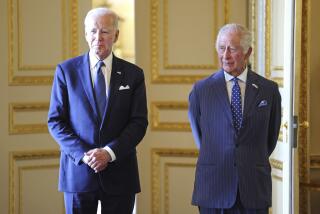Britain, France Agree on Closer Military Ties
- Share via
LONDON — French and British leaders agreed Friday on measures for closer military cooperation and discussed the possible joint development of a new nuclear missile.
At their annual meeting, they decided on closer ties between their armed forces and confirmed plans to open routine military contracts to bidders from both countries.
Unofficially, Prime Minister Margaret Thatcher is reported to have discussed the idea of jointly developing a missile at a separate meeting in her office with French President Francois Mitterrand and Premier Jacques Chirac.
Aides said that because of the other issues on the agenda, there was no time for detailed talks on the subject. Britain and France, Western Europe’s only nuclear powers, have never previously cooperated in the field of nuclear weapons.
British defense officials described the Anglo-French missile discussions as preliminary. They indicated that talks have also been undertaken with the United States to explore the joint development of a cruise missile system.
‘Very Attractive Proposition’
“Particularly in the nuclear area, where our total requirement isn’t that large, collaboration is obviously a very attractive proposition,” a British defense official said. “The French are one possibility, the Americans are another. We’re still at the earliest stages of this. We don’t have to have a replacement weapon in place for several years.”
Under discussion is an improved version of the French ASMP, an air-launched cruise missile produced by the French firm Aerospatiale that is now being put into service with the French air force.
The ASMP has a range of 160 miles and flies at three times the speed of sound, more than 2,000 m.p.h. Unlike the slower American cruise missile, the ASMP relies on speed rather than stealth to reach its target.
Longer Range
Britain’s air force reportedly wants to cooperate on a longer-range version, which could be effective at up to 250 miles. The missile would replace obsolete nuclear bombs that have been part of the British arsenal since the 1960s.
Friday’s talks reflect changes taking place in West European
attitudes. Some authorities believe that economic pressures will almost certainly force the United States to reduce its military commitment in Europe and that as a consequence, greater cooperation among European nations is essential.
Franco-German Ties
This sort of thinking has given impetus to an effort by France and West Germany to strengthen their bilateral ties.
Commenting on the prospects for a reduced American commitment, London’s Financial Times said: “A realistic defense policy for Europe cannot be based just on the hope that such a day will never come. Contingency plans have to be made. . . .”
The Financial Times went on to urge Anglo-French cooperation on nuclear weapons.
Historically, British development of nuclear weapons has been--and continues to be--linked to the United States. Britain’s primary nuclear deterrent, its fleet of Polaris submarines, is being replaced with the U.S. Trident system at a cost of $17 billion.
After Friday’s discussions with the French, George Younger, the British secretary of defense, announced that French nuclear submarines will be permitted for the first time to visit British ports, and that the number of Anglo-French military exercises will be increased.
More on Military Contracts
Also, Britain and France recently established a committee to encourage joint reciprocal bidding for routine military contracts.
In an interview with the French magazine L’Express, Prime Minister Thatcher recently urged France to expand its cooperation with the North Atlantic Treaty Organization. She urged France to commit itself to opening its ports to NATO reinforcements in times of crisis.
“In a situation like that, it would be reasonable to be able to use French ports, and that should be written into France’s own defense structure,” she said.
France withdrew from NATO military operations in 1966, but continues to take part in its political activities.
More to Read
Sign up for Essential California
The most important California stories and recommendations in your inbox every morning.
You may occasionally receive promotional content from the Los Angeles Times.










